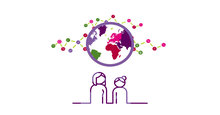How can developed countries support global health and wellbeing and contribute to ending poverty? Here’s one way. By supporting access to family planning for women and girls.
At least 225 million women worldwide who wish to avoid pregnancy lack access to family planning information, supplies and services. In most developing countries, the availability of contraception relies largely on funding from the aid programmes of donor countries. Yet there is a funding gap of around $273 million between now and 2020. If this gap is not closed, the reproductive health needs and rights of millions of women in these countries will not be met. And progress towards the achievement of the Sustainable Development Goals will be set back significantly. But if all the women globally who wish to have access to modern forms of contraception have their needs met, this will make a significant impact on the targets of combatting poverty, improving health and achieving gender equality, women's empowerment and sustainable development.
The IFPA has produced this to highlight the need to increase funding for family planning in order to meet the unmet need for modern forms of contraception worldwide.
The IFPA is a member of Countdown2030Europe Consortium, a consortium of nongovernmental organisations working in 12 European countries and with the EU institutions to ensure that reproductive health and family planning are a funding priority for European donors and a policy priority in Europe and globally. This video is part of the Consortium's work to ensure that 120 million additional women and girls have access to modern methods of family planning by 2020.

